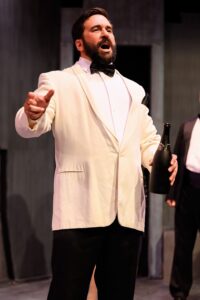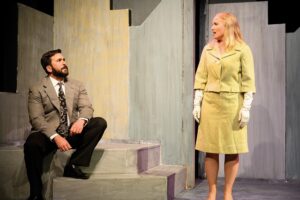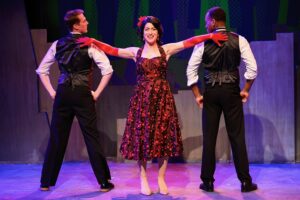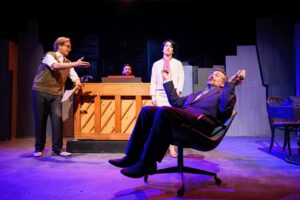Merrily We Roll Along
Stephen Sondheim (Music & Lyrics); George Furth (Book)
Based on the Original Play by George S. Kaufman & Moss Hart
42nd Street Moon

6 a.m., October 1957, on a rooftop of a New York apartment building, two friends look to the sky, searching for the world’s first orbiting satellite. Frank has just been released from the Army and is about to move in with his pal, Charley. As they look heavenward, Franklin tells Charley how much he loves Charley’s plays and suggests they turn one into a musical. At that moment, another twenty-something, a woman named Mary, joins them, soon to discover that the piano music she has been hearing and admiring is coming from Frank. When suddenly Sputnik appears in the dawning sky, the three link their pinky fingers, pledging to be friends forever and declaring in beautifully sung harmony,
“It’s our time, breathe it in,
Worlds to change, worlds to win.
Our time coming through,
Me and you, pal,
Me and you.”
What appears to be the opening of a musical about a friendship that will blossom into something these three young “movers and shakers,” “the names in tomorrow’s papers” can yet hardly imagine is in fact the closing scene for Stephen Sondheim (music and lyrics) and George Furth’s (book) 1981 premiering Merrily We Roll Along. The actual opening scene takes place twenty years later, to be followed by eight more scenes, each turning back time a few years. In the musical’s initial scene of 1976, Mary is a famous author; Charley, a Pulitzer-Prize-winning playwright; and Franklin, a talk-of-Hollywood film producer. What they are not anymore are friends.
How that friendship and each of their lives – especially that of composer-turned-filmmaker Franklin Sheppard – changes over those years (in many ways for the worse) is revealed step-by-step, but in reverse. 42nd Street Moon opens a rousing, robust, and oft riveting Merrily We Roll Along in which a first-class cast of fifteen bring much acting muscle and notable musical prowess to full bear under the clever and captivating direction of Dennis Lickteig.
As Franklin sits alone at his piano staring at a long-ignored book of his compositions, members of his past twenty years – wives, colleagues, friends, admirers, even son – circle him while coaxing in song, “Dreams don’t die … Time goes by, and hope goes dry, but you can still tend to your dream” (“Merrily We Roll Along”). As Franklin stares at the closed songbook, his life of the past twenty years begins to play in reverse, with various people pointedly asking in harmonies, “How can you get so far off the track? Why don’t you turn around and go back?” And as a giant, projected clock’s hands turn ever backward, Franklin relives his creative peaks and insecure valleys, his friendships won and lost, his wives and lovers come and gone. As we watch, we imagine and we hope that somehow Frank will rediscover in these memories the excitement and energy to inspire him to open that book on his piano and begin to compose again from his heart.

Will Giammona reprises with renewed grit and gusto the role of Franklin Shepard for which he won a Theatre Bay Area best acting award in a Pinole Community Players production of 2014. His solid and rich vocals serve the part well as he time and again delivers Sondheim’s demanding requirements with exacting yet pleasant precision. As the years pass in reverse, the overall mannerisms he brings to Franklin are vividly seen in eyes, posture, and overall attitude that alter from middle-age success tinged with disappointment and despair back to his thirties full of confidence and even cockiness on back to his twenties of youthful wonder and daring, creative risk-taking. The sparkle that exudes in his voice and is enhanced by a contagious grin that we more and more see as he becomes younger certainly has faded as his nature has hardened when we meet him in the opening scenes. However, his Franklin does seem to retain throughout the years recurring threads of that younger self when the creative juices at the keyboard run through his veins and entire being. Years later after his initial award-winning performance, Will Giammona has once again found a Franklin that is award-deserving.

Joining him in role reprisal from that 2014 production is a stage-commanding, performance-impressive DC Scarpelli as Franklin’s 1957 best-friend and apartment-mate, Charley Kringas. Charley becomes Franklin’s lyricist partner, leading to the pair’s eventual Broadway hit, Musical Husband. His Charley is often massively eruptive in both joy and anger, employing big-gesturing, bombastic, even frenetic moves and expressions. In a 1973, TV, joint interview with Franklin, Charley describes in a show-stopping number (“Franklin Shepard, Inc.”) the creative process of his and Franklin’s, his song punctuated by notes of a piano’s arpeggio and by the tinny clicks of an old typewriter. As he tries on air to convince Franklin to abandon his movie aspirations and to come back to stage musicals, Charley becomes increasingly crazed and goes into rants. That same kind of fury rips its ugly head in a 1968 scene where again the friends fight over creative differences (“Old Friends”). But in this case, Charley reluctantly but surely recalls their long history of friendship (still to be revealed in later scenes of earlier years), with the two of them being joined by the third of their friendship trio, Mary Flynn, as they all reconnect their pinky fingers while singing in clever, line-dance movements, “What’s to discuss, old friends? Here’s to us, old friends! Who’s like us, old friends? Damn few.”
 Mary is compassionately and compellingly played by Melissa Wolfklain. We meet Mary at her worst when years of secretly loving Franklin while watching him make bad choice after bad choice in his love life have taken a huge toll on her, leading her to a drunken blow-up at a party honoring his latest film. While everyone else sings praises in “That, Frank,” her Mary – full of icy, biting cynicism – insults him, his friends, and his latest, extra-marital fling, Gussie, in a scene of rapid-fire, back-and-forth Sondheim lyrics as well as explosive outbursts by Mary. But as the years unfold backwards, we get to see a Mary that is full of life, who adores both Franklin and Charley. They often in resounding trios join her as she sings clear notes full of heart-felt passion and deep-down spunk (as in “Old Friends, Like It Was” with Franklin and “It’s a Hit” with Charley and Franklin and others). But her love of Franklin is real and is heard in a poignant, gripping “Not a Day Goes By” when her Mary sings to herself in the side-stage shadows of her enduring but unspoken love of Franklin as at the same time, he and his first wife-to-be, Beth, sing the same words as they are launching their life together.
Mary is compassionately and compellingly played by Melissa Wolfklain. We meet Mary at her worst when years of secretly loving Franklin while watching him make bad choice after bad choice in his love life have taken a huge toll on her, leading her to a drunken blow-up at a party honoring his latest film. While everyone else sings praises in “That, Frank,” her Mary – full of icy, biting cynicism – insults him, his friends, and his latest, extra-marital fling, Gussie, in a scene of rapid-fire, back-and-forth Sondheim lyrics as well as explosive outbursts by Mary. But as the years unfold backwards, we get to see a Mary that is full of life, who adores both Franklin and Charley. They often in resounding trios join her as she sings clear notes full of heart-felt passion and deep-down spunk (as in “Old Friends, Like It Was” with Franklin and “It’s a Hit” with Charley and Franklin and others). But her love of Franklin is real and is heard in a poignant, gripping “Not a Day Goes By” when her Mary sings to herself in the side-stage shadows of her enduring but unspoken love of Franklin as at the same time, he and his first wife-to-be, Beth, sing the same words as they are launching their life together.

As Beth, Juliana Lustenader bookends that later-in-the-musical, but earlier-in-her-life (1960) “Not a Day Goes By” with a moving, powerfully rendered solo in a 1967 scene where she realizes she has lost but will always continue to love her philandering husband to a woman named Gussie. Franklin has been the target for several years of the highly tantalizing, viperous temptations of Gussie Josephson, wife to Franklin’s Broadway producer and friend, Joe.

Christine Capsuto-Shulman is thoroughly and even delightfully devilish as her Gussie finds every opportunity to stroke, stimulate, and seduce Franklin. Employing a pulsating, singing voice that uses every note to allure Franklin’s attention, her Gussie at other times sings with a trumpeting voice to command the spotlight of anyone and everyone within her dominating realm. There is nothing ever subtle about her Gussie, including all the many, highly fashionable shades and styles of bright red that she wears throughout the reversing scenes of years.
Director Dennis Lickteig and Choreographer Ashley Cowl team to produce scene after scene of wowing numbers involving both the three amigos (Franklin, Charley, Mary) as well others that come and go in their lives. The 1964 scene of the boys’ opening night on Broadway is a terrifically conceived and upbeat “It’s a Hit” that builds from incredulous, breathy realizations of “It’s … A … Hit” to a firework display of sung intensity, with the speed of sung lyrics increasing to total elation. An ensemble of bodies moving like a living-breathing amoeba highlight “The Blob” in a cocktail gathering hosted by Gussie where her lah-de-dah guests gush with false flattery over Franklin and Charley’s latest song creation.

A delineation of all the Kennedy family’s members and characteristics is hilariously sung and enacted by Mary, Charley, and Franklin in 1960 (“Bobbie and Jackie and Jack”) while the same three illustrate in Sondheim-enhanced fashion their individual creative processes that shows in action the piano-typewriter dueling process that Charley later sings about on the disastrous 1973, TV interview (“Opening Doors”). As he looks on, their later-Broadway producer, Joe (Chris Reber) comically hits every note right as he tries to convince them to write something with a “mel-o-dee-dee-dee” that people will “hum-hum-hum” when they leave the theatre (something Stephen Sondheim surely must have heard himself over and again early in his own career).

As varying numbers of ensemble members enter to sing seven, well-crafted transitions to roll back the years, they invariably introduce the fashions of years past – giving an initial glimpse at the vast array of period costumes designed by Brooke Jennings that range from luxurious gowns of the rich in late-seventies Hollywood to miniskirts and boots of the ‘60s in New York and everything in between. As the sing the years backward, they also without effort and with much pizzazz whirl in and out aspects of Kuo-Hao Lo’s scenic design that transport them and us to such varied places as a rooftop, TV studio, Broadway stage and backstage, and apartment of the rich-and-famous – each defined and highlighted appropriately by the lighting design of Brittany Mellerson.
It is easy to see how many people see Merrily We Roll Along as a sad story about how the greed for fame and fortune leads a brilliant composer to lose his closest friends and to strike out time and again in love. However, Director Dennis Lickteig in the evening’s program notes reminds us that an oft-repeated line throughout the unfolding years is “Dreams don’t die.” Reflecting on his “Notes” and on the exceptionally entertaining and enlightening 42nd Street Moon production of Stephen Sondheim’s Merrily We Roll Along, I am going to remember the opening scene of Franklin sitting at his piano with his memories swirling about him. I am going to bet he opens that book and starts penning a new song because in fact, “Dreams don’t die … Time goes by, and hope goes dry, but you can still tend to your dream.”
Rating: 5 E
A Theatre Eddys Best Bet Production
Merrily We Roll Along continues through April 9, 2023, in production by 42nd Street Moon at the Gateway Theatre, 215 Jackson Square, San Francisco. Tickets are available at http://42ndstmoon.org .
Please note that all patrons must wear masks inside the theatre.
Photo Credits: Ben Krantz Studio

Leave a Reply